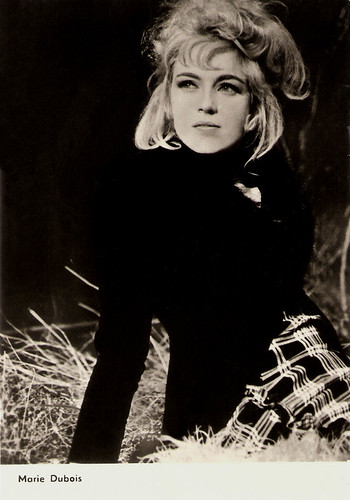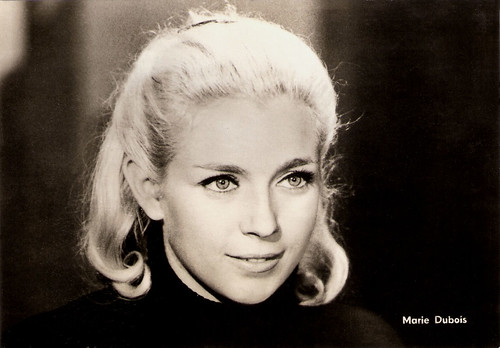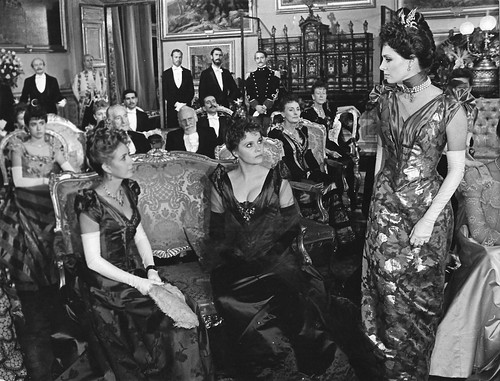
East-German postcard by VEB Progress Filmvertrieb, no. 2918, 1967. Photo: Marie Dubois in L'âge ingrate/That Tender Age (Gilles Grangier, 1964).

East-German postcard by VEB Progress Filmvertrieb, no. 186/69.
New Wave
Marie Dubois was born Claudine Lucie Pauline Huzé in 1937 in Paris. She studied at l'École de la rue Blanche (ENSATT) and followed lessons by Henri Rollan at the Conservatoire.
She made her film debut in 1959, but first gained notice the next year as waitress Léna in the crime drama Tirez sur le pianist/Shoot the Piano Player (François Truffaut, 1960). In this loving homage to Hollywood gangster films, Charles Aznavour starred as the piano player with whom Dubois’ character is in love.
François Truffaut first noticed Marie Dubois when he came across her headshot during pre-production and attempted to set up several meetings with the actress, but Dubois never showed up. Truffaut finally saw Dubois perform on a TV show and immediately wanted to cast her shortly before filming began. Truffaut changed her name Claudine Huzé to Marie Dubois because she reminded him of the titular character of his friend Jacques Audiberti's novel 'Marie Dubois'.
She has since played mainly supporting roles. In the 1960s she appeared in the Nouvelle Vague (New Wave) films Une femme est une femme/A Woman Is a Woman (Jean-Luc Godard, 1961) with Anna Karina, Jules et Jim/Jules and Jim (François Truffaut, 1962) with Jeanne Moreau, and Le Voleur/The Thief of Paris (Louis Malle, 1964) with Jean-Paul Belmondo.
With Belmondo, she co-starred in four films. She also played in comedies like La Ronde/Circle of Love (Roger Vadim, 1964), La Grande Vadrouille (Gérard Oury, 1966), and Monte Carlo or Bust/Those Daring Young Men in Their Jaunty Jalopies (Ken Annakin, 1969).

Italian press photo. Photo by Mario Tursi. Marie Dubois, Laura Antonelli and Jennifer O'Neill in L'innocente/The Innocent (Luchino Visconti, 1976). Setting: Palazzo Colonna, Rome.
One of the faces of the French avant-garde
Marie Dubois liked to work with young directors and she became one of the faces of the French avant-garde cinema of the 1970s. These films include La Maison des Bories/The House of the Bories (Jacques Doniol-Valcroze, 1970) with Matthieu Carriere, Bof ... Anatomie d'un Livreur/Bof (Claude Faraldo, 1971) and the black-and-white Swiss feature Les Arpenteurs/The Surveyors (Michel Soutter, 1972).
More mainstream was the spy thriller Le Serpent/Night Flight from Moscow (Henri Verneuil, 1973) with Yul Brynner and Dirk Bogarde. An artistic and commercial success was Vincent, François, Paul et les autres/Vincent, Francois, Paul and the Others (Claude Sautet, 1974), a gentle character study of a group of friends (Gérard Dépardieu, Yves Montand, Serge Reggiani and Michel Piccoli) who meet each weekend in the country for food, drink and conversation.
Another highlight was Luchino Visconti’s last film, the period drama L'Innocente/The Innocent (1976). In 1978 she won the César Award for Best Supporting Actress for her role as Dominique Montlaur in the psychological thriller La Menace (Alain Corneau, 1977) starring Yves Montand.
Another success was the satire Mon Oncle d'Amérique/My American Uncle (Alain Resnais, 1980) which scored a hit with filmgoers and critics alike and was honoured with six Cesar Awards. In the 1980s she also appeared in the seriocomedy Garçon!/Boy! (Claude Sautet, 1983) with Yves Montand as a middle-aged waiter, and La Petite Sirene (Roger Andrieux, 1984).
For her role as Lucette Beulemans in Descente aux enfers/Descent Into Hell (Francis Girod, 1986), she received a second César nomination for Best Supporting Actress. Marie Dubois’s last screen role was as the grandmother in the TV film Le bon fils/The Good Son (Irène Jouannet, 2001). She married French film actor Serge Rousseau in 1961 and they remained together until he died in 2007.
Part of Marie Dubois' screen test for Tirez sur le pianist. Source: Luke the Lux (YouTube).
Sources: Le Monde (French), Allocine (French), AllMovie, Wikipedia and IMDb.
This post was last updated on 31 January 2024.
No comments:
Post a Comment